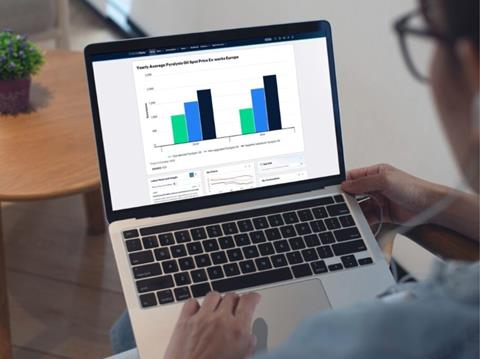
In the latest Finalist Interview ahead of the Sustainability Awards, we spoke to Independent Commodity Intelligence Services (ICIS) about its Pyrolysis Oil Pricing Index, said to provide transparent pricing data for chemical recycling and nominated in the Commercialized Best Practice category.
You’re a finalist in the Sustainability Awards 2025. Congratulations! To start off, could you summarize your entry, in less than 50 words?
The ICIS Pyrolysis Oil Pricing Indexes provide transparent pricing data, commentary, and analysis for chemical recycling. It facilitates market growth, investments, and transition to a circular plastics economy by offering benchmarks for both plastic-derived and tyre-derived pyrolysis oil pricing.
Why do you think the judges were impressed with your entry? Tell us about what is innovative about your project and/or about its impact on packaging sustainability.
The ICIS Pyrolysis Oil Pricing Indexes likely impressed the judges as it solves a critical challenge in the circular economy - price transparency in the emerging chemical recycling market.
With the potential to lead chemical recycling by capacity, pyrolysis oil is emerging as a key solution for producing virgin-like materials. This is seen by many as an essential route to mass-scale food contact recycled packaging material, particularly in markets such as European polyolefins.
Pyrolysis oil, produced from mixed plastic waste and end-of-life tyres, provides a more circular alternative to conventional fossil fuels used in refineries and plastic and tyre manufacturing. Because it often uses waste that is hard to recycle using traditional methods, pyrolysis oil is helping tackle the global plastic waste crisis.
Demand for these materials is rapidly increasing, supported by both voluntary brand targets and regulatory pressure. The innovation in ICIS’ offering is twofold. First, it introduced the first-ever pricing indices for pyrolysis oil, which has allowed the industry to track market dynamics and set fair prices for these recycled materials.
This transparency fosters trust and decision-making among industry players by providing independent, reliable pricing data. ICIS enables businesses to accurately assess the economic viability of investing in chemical recycling technologies. The transparency provided by the index also supports decision-making regarding the sourcing of recycled materials, helping companies mitigate the environmental impacts associated with plastic and tyre production.
The availability of trusted and reliable pricing information is a vital step in maturing the chemical recycling industry and making it a mainstream part of polymer supply chains. ICIS’ pricing methodology was built in collaboration with the market, and purpose built to meet its needs. The methodology process includes regular peer-review and consultation with the market and is subject to a rigorous auditing process to ensure accuracy and independence.
As demand for sustainable packaging increases, businesses can now rely on this accurate pricing data, commentary and analysis to navigate the complexities of using recycled content in their packaging solutions.
Incorporating pyrolysis oil into packaging production helps close the loop on plastic waste, supporting a more sustainable and circular economy. Through the ICIS Pyrolysis Oil Pricing Indexes, businesses now have the tools to assess the economic feasibility of using chemically recycled materials in their packaging, helping the industry to scale to meet growing sustainability demands. By bridging the gap between mechanical and chemical recycling, ICIS empowers the industry to make informed data-driven decisions, accelerating the shift to a circular economy.
Finally, can you tell us about the ongoing development of your project, e.g. how your innovation/initiative has been received by the industry, or what the next steps are in commercialization/product development?
Since its launch, the ICIS Pyrolysis Oil Pricing Indexes has seen significant positive responses across the industry. The tool has been adopted by multiple players in the chemical recycling and petrochemical sectors – including as a benchmark in contracts - helping them make informed investment decisions. The indexes have also gained substantial traction in financial markets, with investors using them to assess market conditions and identify growth opportunities.
Industry engagement has grown steadily, with a 50% increase in unique visitors to the mixed plastic waste and pyrolysis oil pricing service in 2024 alone. This response highlights the growing recognition of the importance of transparent data and fostering a more sustainable plastics economy. By supporting the growth of chemical recycling and encouraging investment in green technologies, ICIS is playing a key role in the transition to a more sustainable and circular plastics economy.
ICIS is always proactive in developing its pricing indices in collaboration with the industry as markets grow and develop. As the pyrolysis oil and chemical recycling market grows and matures, we will look to add new indices both on the feedstock side – such as the recycled polyolefin agglomerate pricing index we introduced in late 2024, which is an emerging key raw material in pyrolysis oil production – and in chemical recycling itself.
Our ultimate goal is providing trustworthy independent data which facilitates greater market maturity and supports further innovation in chemical recycling technologies. The long-term goal is to drive widespread adoption of sustainable practices across the value chain, helping the industry make informed decisions on their circularity strategies.
The winners of the Sustainability Awards 2025 will be announced at the Sustainable Packaging Summit, taking place in Utrecht on 10-12 November. The Summit mobilizes leaders of the FMCG value chain, policymakers, NGOs, recyclers and investors to collaborate, remove barriers and identify opportunities on the road to sustainable transformation.
To learn more or register, visit: https://www.packagingsummit.earth/2025
If you liked this story, you might also enjoy:
The ultimate guide to the Packaging and Packaging Waste Regulation in 2025
How are the top brands progressing on packaging sustainability?
Everything you need to know about global packaging sustainability regulation in 2025
The key to increasing the use of reusable packaging in supermarkets














No comments yet